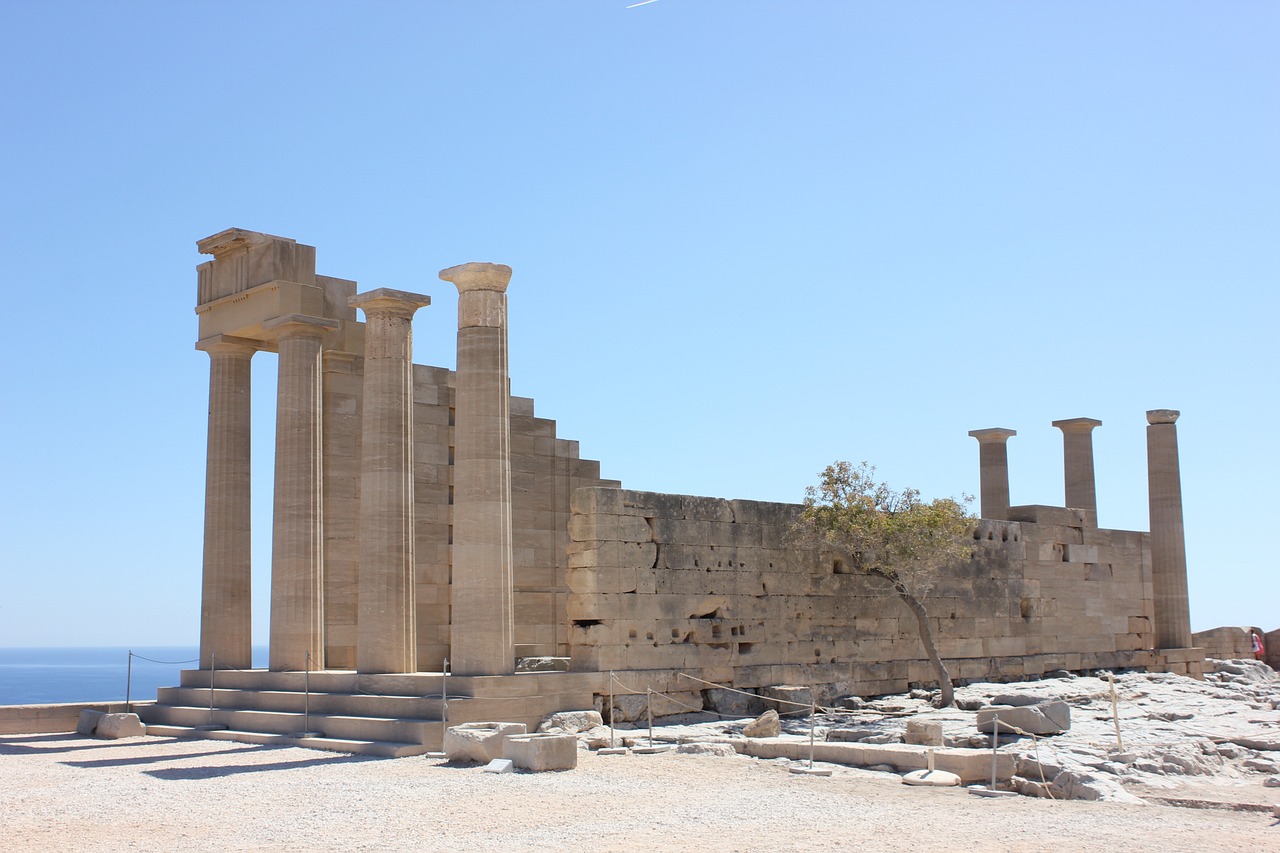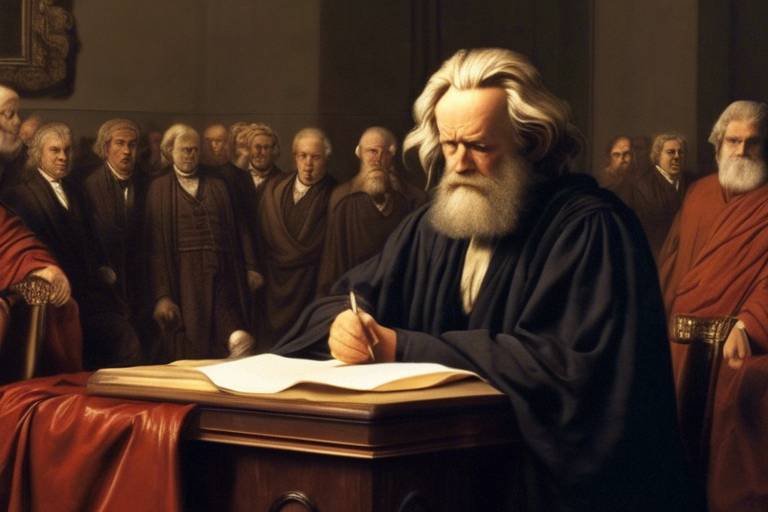Deconstructing the Politics of Ancient Greek Philosophers
The political landscape of ancient Greece was not just a backdrop for the emergence of democracy; it was a vibrant canvas where the ideas of great thinkers like Plato and Aristotle flourished. Their political theories continue to resonate today, echoing in the halls of modern governance and ethical discussions. Imagine a world where the philosophical debates of the past shape the very foundations of our political systems. It's not just history; it’s a living dialogue that influences how we perceive justice, citizenship, and the role of the individual in society. In this article, we will journey through the labyrinth of ancient Greek political thought, uncovering the intricate relationships between ethics and politics, and exploring how these age-old concepts remain relevant in our contemporary discourse.
At the heart of this exploration lies the understanding that ancient Greek philosophers did not merely theorize in isolation. Their ideas were a reaction to the political turmoil of their times. For instance, Plato’s vision of an ideal state was born out of a desire to find stability amidst the chaos of Athenian democracy. He believed that only philosopher-kings, those who understood the essence of justice and the common good, could lead society towards harmony. This notion prompts us to ask: can we trust our leaders to prioritize the collective over their own interests? Plato's blueprint for governance challenges us to consider the qualities we seek in our leaders today.
Conversely, Aristotle's approach offers a refreshing dose of realism. By emphasizing empirical observation and the active role of citizens, he invites us to engage with our political systems rather than simply idealizing them. His insights into citizenship and virtue highlight that being a good citizen isn’t just about rights; it’s about responsibilities. This perspective aligns closely with modern democratic ideals, where civic engagement is crucial. Aristotle’s categorization of governments—monarchies, aristocracies, and democracies—serves as a framework for analyzing the strengths and weaknesses of our current political structures. Are we witnessing the evolution of these forms today? How do they manifest in our daily lives?
Moreover, the Stoics, with philosophers like Seneca and Epictetus, introduced a profound connection between ethics and politics, advocating for virtue as a guiding principle. Their concept of cosmopolitanism challenges us to think beyond our local identities and consider ourselves part of a larger human community. This idea is particularly relevant in our increasingly globalized world, where the actions of individuals can have far-reaching consequences. What does it mean to be a global citizen in today’s society? How do we balance local responsibilities with global ethics?
As we unravel the threads of ancient Greek political thought, it becomes clear that these philosophers were not just theorists; they were practical thinkers addressing the pressing issues of their time. Their legacies continue to shape our understanding of democracy, justice, and the role of individuals in society. The dialogue they initiated is far from over; it is a conversation that evolves with each generation, reminding us that the past is not just a series of events, but a continuous stream of ideas that inform our present and future.
- What is the main contribution of Plato to political thought?
Plato's main contribution lies in his concept of the ideal state, governed by philosopher-kings who prioritize the common good and justice over individual interests.
- How does Aristotle's view of politics differ from Plato's?
Aristotle's approach is more pragmatic, focusing on empirical observation and the active participation of citizens, contrasting with Plato's idealistic vision.
- What is Stoicism and how does it relate to politics?
Stoicism emphasizes virtue and reason as guiding principles in both personal conduct and public affairs, advocating for a sense of global citizenship.
- Why are ancient Greek political theories still relevant today?
These theories provide foundational concepts of democracy, justice, and citizenship that continue to influence modern political discourse and governance.

Plato's Ideal State
Plato's vision of an ideal state, as presented in The Republic, is nothing short of revolutionary. Imagine a society where justice reigns supreme, where the rulers are not merely politicians but philosopher-kings—wise guardians who prioritize the welfare of the community over their personal ambitions. This concept challenges the very fabric of governance as we know it, suggesting that true leaders must possess both knowledge and virtue. Plato believed that only those who understand the essence of justice and the good life are fit to govern. In this ideal state, the pursuit of the common good is paramount, and individual desires take a back seat to the needs of society.
In Plato's framework, the state is structured into three distinct classes: the rulers, the auxiliaries, and the producers. Each class has its own role, mirroring the tripartite nature of the human soul, which consists of reason, spirit, and appetite. The rulers embody reason, making wise decisions for the state; the auxiliaries represent spirit, enforcing laws and protecting the society; while the producers, who encompass farmers, artisans, and merchants, satisfy the material needs of the community. This harmonious division ensures that each class contributes to the overall stability and functionality of the state.
Furthermore, Plato emphasizes the importance of education in his ideal state. He argues that only through rigorous education can individuals ascend to the role of philosopher-kings. The educational system is meticulously designed to cultivate virtues and knowledge, enabling the rulers to make informed decisions. This focus on education underscores the belief that a well-governed society is contingent upon the moral and intellectual development of its leaders.
Interestingly, Plato's ideal state also raises questions about freedom and individual rights. While the structure aims for a just society, one might wonder: does this system allow for personal freedom, or does it restrict individual expression in favor of collective harmony? Plato’s answer leans toward the latter, as he posits that true freedom comes from living in accordance with the greater good. In this context, the ideal state serves not only as a political construct but also as a philosophical exploration of ethics and morality.
To summarize, Plato's ideal state presents a compelling vision that intertwines ethics with governance. It challenges us to consider the role of knowledge and virtue in leadership and raises critical questions about the balance between individual rights and the common good. As we navigate contemporary political landscapes, the lessons from Plato's philosophy remain profoundly relevant, inviting us to reflect on what it means to create a just society.
- What is the main idea of Plato's ideal state?
Plato's ideal state emphasizes justice and the role of philosopher-kings who prioritize the common good over personal interests. - How does Plato categorize the classes in his ideal state?
He divides society into three classes: rulers (philosopher-kings), auxiliaries (warriors), and producers (workers), each with distinct roles. - What is the significance of education in Plato's ideal state?
Education is crucial for developing virtuous leaders who can govern wisely and justly. - Does Plato's ideal state allow for individual freedom?
While it prioritizes collective harmony, it raises questions about the extent of personal freedoms in pursuit of the common good.

The Republic,
Plato's vision of an ideal state, as presented in The Republic, emphasizes justice and the role of philosopher-kings, offering a blueprint for governance that prioritizes the common good over individual interests. In this groundbreaking work, Plato proposes that the most enlightened individuals, those who have ascended to understand the true forms of reality, should govern society. He believes that only those who possess wisdom and virtue are fit to rule, as they can discern what is best for the state as a whole. This idea challenges the notion of democracy, suggesting that the masses, often swayed by emotions and ignorance, are not equipped to make decisions that affect the greater good.
In The Republic, Plato outlines his vision of a just society through the allegory of the cave, where individuals are trapped in a world of shadows, mistaking illusions for reality. The philosopher, having escaped the cave, symbolizes the enlightened ruler who can see the truth and thus guide others towards it. This allegory serves as a metaphor for the transformative journey of knowledge and the responsibilities that come with it. Plato argues that the ideal state is structured in a way that mirrors the tripartite nature of the soul, comprising reason, spirit, and appetite. Each class of society corresponds to these elements: the rulers represent reason, the guardians embody spirit, and the producers satisfy the appetites.
Aristotle's pragmatic approach to politics, outlined in Politics, contrasts with Plato's idealism, focusing on the importance of empirical observation and the role of citizens in achieving a balanced and just society. While Plato seeks an ideal world governed by philosopher-kings, Aristotle emphasizes the need for practical governance that reflects the complexities of human nature. He asserts that the best political system is one that is adaptable and considers the actual conditions of the people it serves, rather than an abstract ideal.
Aristotle argues that citizenship is tied to virtue, suggesting that active participation in civic life is essential for personal development and the flourishing of the state, fostering a sense of community responsibility. He believes that individuals should not only be subjects of the law but also contributors to the common good, engaging in political life to cultivate their virtues. This involvement is seen as a pathway to achieving eudaimonia, or a flourishing life, which is the ultimate goal of human existence.
Aristotle categorizes governments into monarchies, aristocracies, and democracies, analyzing their strengths and weaknesses, and advocating for a mixed government as the most stable and just form of rule. He recognizes that each type has its merits but also its potential pitfalls, especially when power becomes concentrated in the hands of a few or when the majority act in their self-interest without regard for justice. Aristotle's insights lead to a nuanced understanding of governance, where the ideal state is one that incorporates elements from various systems to balance power and ensure fairness.
In his political theory, Aristotle highlights the importance of a robust middle class in maintaining stability and preventing the excesses of both the rich and the poor in governance. He posits that a strong middle class can act as a stabilizing force, as they are less likely to pursue extreme measures that could lead to tyranny or mob rule. This observation remains relevant today, as many contemporary political theorists echo Aristotle's sentiments, underscoring the necessity of a diverse and equitable society for sustainable governance.
Both Plato and Aristotle contribute significantly to the understanding of justice, with Plato viewing it as a harmony of the soul and society, while Aristotle emphasizes distributive and corrective justice in practical governance. Plato's idealistic perspective suggests that justice is about fulfilling one’s role within the greater harmony of the state, whereas Aristotle’s approach is more grounded in the realities of human interactions and the need for fairness in the distribution of resources and opportunities.
Stoic philosophers like Seneca and Epictetus offer insights into the relationship between individual ethics and political responsibility, advocating for virtue and reason as guiding principles in both personal conduct and public affairs. They argue that a good life is one lived in accordance with nature and reason, which also extends to how one engages with society and governance.
The Stoics introduced the idea of cosmopolitanism, suggesting that all humans belong to a single community, which has implications for global ethics and the responsibilities of individuals beyond their local or national identities. This perspective challenges parochial views and encourages a sense of shared humanity, emphasizing that our obligations extend to all people, not just those within our immediate social or political circles.
The political theories of ancient Greek philosophers continue to shape contemporary political discourse, influencing modern concepts of democracy, justice, and the role of the individual in society, highlighting their enduring relevance. As we navigate the complexities of modern governance, the insights of Plato and Aristotle remain invaluable, providing frameworks through which we can analyze current political structures and ethical dilemmas.
- What is the main idea of Plato's The Republic?
Plato's The Republic presents a vision of an ideal state governed by philosopher-kings, emphasizing justice and the common good. - How does Aristotle's view of politics differ from Plato's?
Aristotle takes a pragmatic approach, focusing on empirical observation and the importance of active citizenship, contrasting with Plato's idealism. - What is the significance of the middle class in Aristotle's political theory?
Aristotle argues that a strong middle class is essential for stability, preventing the extremes of wealth and poverty from destabilizing governance. - What does Stoicism contribute to political thought?
Stoicism emphasizes the importance of virtue and reason, advocating for a cosmopolitan view that sees all humans as part of a single community.

emphasizes justice and the role of philosopher-kings, offering a blueprint for governance that prioritizes the common good over individual interests.
Plato's vision of an ideal state, as presented in The Republic, emphasizes justice and the role of philosopher-kings, offering a blueprint for governance that prioritizes the common good over individual interests. In this utopian society, Plato argues that only those who possess true knowledge and wisdom should govern. He believed that philosophers, due to their understanding of the Forms (the ultimate truths), are best equipped to make decisions that benefit society as a whole. Imagine a world where leaders are not swayed by personal gain or political power, but instead are guided by a profound understanding of what is just and virtuous. This idea is revolutionary and sets the stage for discussions about the nature of leadership and authority.
In Plato's ideal state, the structure is meticulously designed to ensure that the rulers are not only intelligent but also virtuous. The philosopher-kings are portrayed as guardians of the state, making decisions based on reason rather than emotion. This leads us to ponder: can we trust our leaders to act in the best interest of the public? Plato's answer is a resounding yes, provided that those leaders are philosophers who have undergone rigorous training in ethics and governance. His model suggests that the state should be structured in such a way that the rulers are incentivized to act for the common good, rather than for their own personal interests.
Moreover, Plato introduces the concept of the "noble lie," a myth or untruth that is told to maintain social harmony and the stability of the state. This idea raises ethical questions about the lengths to which leaders might go to ensure the well-being of their citizens. Is it acceptable for leaders to manipulate the truth if it serves a greater good? Herein lies a tension that resonates even in contemporary politics, where the line between truth and manipulation often blurs.
In summary, Plato's ideal state is a profound exploration of justice and governance. His emphasis on philosopher-kings as the ideal rulers challenges us to consider the qualities that we value in our leaders today. Can we find a balance between wisdom and power, ensuring that those who govern are truly committed to the welfare of the society they serve? This question remains relevant as we navigate the complexities of modern governance.
Aristotle's pragmatic approach to politics, outlined in Politics, contrasts with Plato's idealism, focusing on the importance of empirical observation and the role of citizens in achieving a balanced and just society. He believed that understanding politics requires a grounded approach, one that takes into account the realities of human behavior and societal structures. Aristotle’s method is akin to a scientist observing the natural world; he examines existing political systems and their outcomes to derive principles that can guide future governance.
Aristotle argues that citizenship is tied to virtue, suggesting that active participation in civic life is essential for personal development and the flourishing of the state, fostering a sense of community responsibility. He posits that a good citizen is not merely someone who follows laws but is actively engaged in the political process, contributing to the common good. This perspective highlights the notion that democracy is not just about voting; it’s about being involved in the community and striving for the betterment of society.
Aristotle categorizes governments into monarchies, aristocracies, and democracies, analyzing their strengths and weaknesses, and advocating for a mixed government as the most stable and just form of rule. He believed that each form of government has its merits and pitfalls, and the best system is one that incorporates elements from each to balance power and ensure fairness.
In his political theory, Aristotle highlights the importance of a robust middle class in maintaining stability and preventing the excesses of both the rich and the poor in governance. He argues that a strong middle class creates a buffer that can help mediate between the extremes of wealth and poverty, fostering a more equitable society.
Both Plato and Aristotle contribute significantly to the understanding of justice, with Plato viewing it as a harmony of the soul and society, while Aristotle emphasizes distributive and corrective justice in practical governance.
Stoic philosophers like Seneca and Epictetus offer insights into the relationship between individual ethics and political responsibility, advocating for virtue and reason as guiding principles in both personal conduct and public affairs.
The Stoics introduced the idea of cosmopolitanism, suggesting that all humans belong to a single community, which has implications for global ethics and the responsibilities of individuals beyond their local or national identities.
The political theories of ancient Greek philosophers continue to shape contemporary political discourse, influencing modern concepts of democracy, justice, and the role of the individual in society, highlighting their enduring relevance.
- What is the main idea of Plato's ideal state?
Plato's ideal state emphasizes justice and the role of philosopher-kings, who are best equipped to govern for the common good. - How does Aristotle's view of government differ from Plato's?
Aristotle focuses on empirical observation and the practicalities of governance, advocating for a mixed government that balances different forms of rule. - What role does citizenship play in Aristotle's political theory?
Aristotle believes that active participation in civic life is essential for both individual virtue and societal well-being. - How do Stoic philosophers contribute to political thought?
Stoic philosophers emphasize the importance of individual ethics and virtue in public affairs, promoting the idea of cosmopolitanism.

Aristotle's Political Realism
When we dive into the world of , we find ourselves stepping away from the idealistic visions of governance that Plato so passionately painted. Aristotle, in his seminal work Politics, takes a more grounded approach to understanding the complexities of human society and governance. He emphasizes the importance of empirical observation and the realities of human behavior, arguing that the ideal state must be built on what is practically achievable rather than what is merely aspirational.
Aristotle's perspective is refreshingly pragmatic. He believed that to understand politics, one must first understand the nature of human beings. Unlike Plato, who envisioned a society ruled by philosopher-kings, Aristotle recognized that people are driven by their desires, ambitions, and social interactions. He argued that the state exists not just for the sake of governance but to enable individuals to achieve their fullest potential. In this sense, politics is deeply intertwined with ethics, as the way we govern ourselves reflects our values and virtues.
One of the most compelling aspects of Aristotle's political realism is his categorization of different types of governments. He identifies three ideal forms of governance: monarchy, aristocracy, and democracy. Each has its strengths and weaknesses, and Aristotle meticulously analyzes these forms, weighing their effectiveness in promoting the common good. For instance, while democracy allows for broader participation, it can also lead to the tyranny of the majority, where the rights of minorities may be overlooked. Aristotle advocates for a mixed government, which combines elements of these forms to create a more stable and just society.
In addition to his classification of governments, Aristotle places significant emphasis on the role of the middle class in maintaining political stability. He argues that a robust middle class acts as a buffer between the rich and the poor, preventing the extremes of wealth and poverty from destabilizing society. By fostering a sense of community responsibility, the middle class can help ensure that governance is not just about the interests of the few but rather reflects the needs of the many.
Aristotle's insights into citizenship and virtue are equally important. He posits that true citizenship is not merely a legal status but a reflection of one's active participation in civic life. This participation is essential for personal development and the flourishing of the state. Aristotle believed that a virtuous citizen is one who contributes to the common good, thus intertwining individual ethics with political responsibility. In his view, the ideal citizen is actively engaged in the political process, striving for the betterment of society as a whole.
Ultimately, Aristotle's political realism offers a rich tapestry of ideas that remain relevant today. His emphasis on empirical observation, the importance of a mixed government, and the role of the middle class provide a framework for understanding contemporary political challenges. By recognizing the complexities of human nature and the realities of governance, Aristotle invites us to engage thoughtfully with the political systems that shape our lives.

Politics,
This article explores the political theories of ancient Greek philosophers, examining their contributions to political thought, the interplay between ethics and politics, and their relevance in contemporary discussions on governance and society.
Plato's vision of an ideal state, as presented in The Republic, emphasizes justice and the role of philosopher-kings, offering a blueprint for governance that prioritizes the common good over individual interests.
Aristotle's pragmatic approach to politics, outlined in Politics, contrasts with Plato's idealism, focusing on the importance of empirical observation and the role of citizens in achieving a balanced and just society.
Aristotle argues that citizenship is tied to virtue, suggesting that active participation in civic life is essential for personal development and the flourishing of the state, fostering a sense of community responsibility.
Aristotle categorizes governments into monarchies, aristocracies, and democracies, analyzing their strengths and weaknesses, and advocating for a mixed government as the most stable and just form of rule.
In his political theory, Aristotle highlights the importance of a robust middle class in maintaining stability and preventing the excesses of both the rich and the poor in governance.
Both Plato and Aristotle contribute significantly to the understanding of justice, with Plato viewing it as a harmony of the soul and society, while Aristotle emphasizes distributive and corrective justice in practical governance.
Stoic philosophers like Seneca and Epictetus offer insights into the relationship between individual ethics and political responsibility, advocating for virtue and reason as guiding principles in both personal conduct and public affairs.
The Stoics introduced the idea of cosmopolitanism, suggesting that all humans belong to a single community, which has implications for global ethics and the responsibilities of individuals beyond their local or national identities.
The political theories of ancient Greek philosophers continue to shape contemporary political discourse, influencing modern concepts of democracy, justice, and the role of the individual in society, highlighting their enduring relevance.
Politics, at its core, is a complex web of interactions that govern how societies organize themselves. Ancient Greek philosophers laid the groundwork for understanding these dynamics, presenting theories that resonate even today. Plato and Aristotle not only defined the roles of governance but also the responsibilities of citizens within that framework. For Plato, the state is a reflection of the individual soul, where rulers must possess wisdom and virtue to create a just society. In contrast, Aristotle viewed politics as a practical endeavor, emphasizing the need for empirical evidence and the active participation of citizens in governance.
In the political arena, the concept of justice plays a pivotal role. Both philosophers grappled with what it means to be just, with Plato advocating for a harmonious society led by knowledgeable rulers, and Aristotle focusing on the practical application of justice through laws and civic responsibility. This ongoing dialogue about the nature of justice is what makes their theories so impactful. They compel us to ask: What is the ideal balance between the individual's rights and the community's needs? How do we ensure that governance serves the greater good?
Furthermore, the ancient Greeks introduced vital concepts that resonate in modern politics, such as the importance of civic engagement and the role of ethics in governance. The interplay between personal virtue and political responsibility is a theme that continues to be relevant. In today's world, we often find ourselves grappling with ethical dilemmas in politics—issues that require not just legal solutions but a deeper understanding of our moral obligations to one another.
To illustrate the evolution of political thought, consider the following table that contrasts the views of Plato and Aristotle on key political concepts:
| Concept | Plato | Aristotle |
|---|---|---|
| Ideal State | Philosopher-kings guided by wisdom | Empirical governance with citizen involvement |
| Justice | Harmony of the soul and society | Distributive and corrective justice |
| Role of Citizens | Limited to those with philosophical insight | Active participation essential for a flourishing state |
As we reflect on these ancient insights, it's clear that the study of politics is not just an academic exercise; it is a vital part of our daily lives. The decisions made by our leaders affect every aspect of our existence, from education to healthcare, and even our freedoms. Thus, understanding the political theories of the past allows us to navigate the complexities of the present with greater clarity.
- What is the main difference between Plato and Aristotle's views on governance?
Plato emphasizes the need for philosopher-kings and an ideal state, while Aristotle focuses on empirical observation and the active role of citizens in governance. - How do ancient Greek political theories apply to modern politics?
Many concepts, such as justice, civic responsibility, and the role of ethics in governance, are still relevant today and influence our political discourse. - What is cosmopolitanism in Stoic philosophy?
Cosmopolitanism is the idea that all humans belong to a single community, emphasizing global ethics and responsibilities beyond local or national identities.

contrasts with Plato's idealism, focusing on the importance of empirical observation and the role of citizens in achieving a balanced and just society.
This article explores the political theories of ancient Greek philosophers, examining their contributions to political thought, the interplay between ethics and politics, and their relevance in contemporary discussions on governance and society.
Plato's vision of an ideal state, as presented in The Republic, emphasizes justice and the role of philosopher-kings, offering a blueprint for governance that prioritizes the common good over individual interests.
Aristotle's pragmatic approach to politics, outlined in Politics, contrasts with Plato's idealism, focusing on the importance of empirical observation and the role of citizens in achieving a balanced and just society. Where Plato envisioned a world governed by abstract ideals, Aristotle grounded his theories in the realities of human experience and the observable world. He believed that to understand politics, one must look at the actual behaviors and needs of people within their communities. This empirical approach is not just a philosophical stance; it is a call to action for citizens to engage with their political systems actively.
Aristotle argues that citizenship is tied to virtue, suggesting that active participation in civic life is essential for personal development and the flourishing of the state, fostering a sense of community responsibility.
Aristotle categorizes governments into monarchies, aristocracies, and democracies, analyzing their strengths and weaknesses, and advocating for a mixed government as the most stable and just form of rule.
In his political theory, Aristotle highlights the importance of a robust middle class in maintaining stability and preventing the excesses of both the rich and the poor in governance.
Both Plato and Aristotle contribute significantly to the understanding of justice, with Plato viewing it as a harmony of the soul and society, while Aristotle emphasizes distributive and corrective justice in practical governance.
Stoic philosophers like Seneca and Epictetus offer insights into the relationship between individual ethics and political responsibility, advocating for virtue and reason as guiding principles in both personal conduct and public affairs.
The Stoics introduced the idea of cosmopolitanism, suggesting that all humans belong to a single community, which has implications for global ethics and the responsibilities of individuals beyond their local or national identities.
The political theories of ancient Greek philosophers continue to shape contemporary political discourse, influencing modern concepts of democracy, justice, and the role of the individual in society, highlighting their enduring relevance.
- What is the main difference between Plato and Aristotle's political theories?
Plato focuses on idealism and the concept of philosopher-kings, while Aristotle emphasizes empirical observation and the practical role of citizens in governance.
- How does Aristotle define citizenship?
Aristotle defines citizenship as an active participation in civic life, which is essential for both personal virtue and the health of the state.
- What role does the middle class play in Aristotle's political theory?
Aristotle argues that a strong middle class is crucial for maintaining political stability and preventing the extremes of wealth and poverty from disrupting governance.
- What is Stoicism's contribution to political thought?
Stoicism contributes the idea of virtue and reason as guiding principles in both personal ethics and public responsibility, promoting a sense of global citizenship.

Citizenship and Virtue
When we dive into Aristotle's political philosophy, we find a fascinating interplay between citizenship and virtue. Aristotle believed that being a citizen was not just about holding a title or enjoying certain rights; it was about actively participating in the life of the city-state. He argued that true citizenship demands a commitment to the common good, where individuals contribute to the welfare of their community. In essence, citizenship is a responsibility, not merely a privilege.
Imagine a vibrant garden; each plant represents a citizen. For the garden to thrive, every plant needs to grow and flourish, just as citizens must engage in civic life to foster a healthy society. This engagement is rooted in virtue, which Aristotle defined as the habitual disposition to act in ways that benefit both the individual and the community. He posited that virtues such as courage, temperance, and justice are essential for citizens to cultivate, as they lay the groundwork for a stable and just society.
Active participation in civic duties—like voting, attending public meetings, or even volunteering—allows individuals to practice virtue and develop their character. Aristotle believed that this active involvement not only enhances personal growth but also fortifies the social fabric. In his view, a virtuous citizen contributes to a flourishing community, creating a cycle where personal virtue and civic responsibility feed into one another.
Moreover, Aristotle emphasized the importance of education in nurturing virtue among citizens. He argued that a well-rounded education equips individuals with the knowledge and skills necessary to make informed decisions and engage thoughtfully in political discourse. This education should not be limited to academic knowledge but should also encompass moral and ethical teachings, fostering a sense of community responsibility.
In summary, Aristotle's connection between citizenship and virtue highlights a profound truth: a thriving society relies on the active participation of virtuous individuals. As we reflect on this relationship today, we can see how it resonates with modern discussions about civic duty and personal ethics. The question remains: how can we encourage a culture of active citizenship and virtue in our own communities?
- What is the relationship between citizenship and virtue according to Aristotle?
Aristotle posits that citizenship involves active participation in civic life, which is deeply connected to the cultivation of virtue. Virtuous citizens contribute to the common good, creating a stable and just society. - How can individuals practice virtue in their daily lives?
Individuals can practice virtue by engaging in community activities, making ethical decisions, and striving for personal growth through education and self-reflection. - Why is education important for citizenship?
Education is crucial as it equips individuals with the knowledge and skills necessary to make informed decisions and engage thoughtfully in political discourse, fostering a sense of responsibility towards the community.

Types of Government
Aristotle, in his profound exploration of political systems, categorizes governments into three primary types: monarchy, aristocracy, and democracy. Each of these forms has its unique characteristics, strengths, and weaknesses, reflecting the diverse ways in which societies can be organized. Monarchy, for instance, is ruled by a single individual, often a king or queen, whose authority is typically justified by tradition or divine right. While this can lead to stable governance, it also risks becoming tyrannical if the ruler prioritizes personal power over the common good.
On the other hand, aristocracy is governed by a select group of elites, often based on nobility or wealth. This system can foster wise leadership when the ruling class is virtuous and well-educated. However, it may also lead to oppression of the lower classes if the aristocrats become disconnected from the needs of the populace. In contrast, democracy, characterized by the participation of the masses in decision-making, aims to empower citizens. Yet, Aristotle cautions that pure democracy can devolve into mob rule, where the majority's whims overshadow the rights of the minority.
To illustrate Aristotle's perspective on these forms of government, consider the following table:
| Type of Government | Definition | Strengths | Weaknesses |
|---|---|---|---|
| Monarchy | Rule by a single individual. | Stability and continuity. | Potential for tyranny. |
| Aristocracy | Rule by a small elite group. | Wise and educated leadership. | Risk of oppression and elitism. |
| Democracy | Rule by the majority of citizens. | Empowerment of the populace. | Possibility of mob rule. |
Aristotle further argues for a mixed government as the most stable and just form of rule, combining elements from these three types. This hybrid model aims to balance the strengths and mitigate the weaknesses of each system, creating a governance structure that is responsive to the needs of the people while maintaining order and justice. In this way, Aristotle's insights provide a timeless framework for understanding the complexities of political organization, reminding us that no single form of government is universally ideal.
- What is the best form of government according to Aristotle?
Aristotle advocates for a mixed government that incorporates elements of monarchy, aristocracy, and democracy to balance stability and representation. - How does Aristotle define justice in politics?
Aristotle views justice as both distributive and corrective, emphasizing fairness in the distribution of resources and the rectification of wrongs. - What are the dangers of pure democracy?
Aristotle warns that pure democracy can lead to mob rule, where the majority's desires can overshadow the rights and needs of minorities.

Role of the Middle Class
Aristotle's political theory shines a spotlight on the middle class, portraying it as a cornerstone of a stable and just society. He believed that a robust middle class acts as a buffer against the extremes of wealth and poverty, which can lead to political instability. Imagine a seesaw: if one side is too heavy, it tips over. The same principle applies to society. When the rich accumulate too much power, and the poor are left without means, the balance is disrupted, leading to chaos.
In Aristotle's view, the middle class is not just a demographic; it embodies a set of values and responsibilities crucial for governance. The middle class tends to be more moderate in its views and more invested in the community’s well-being. They are less likely to pursue extreme measures that could destabilize the state. This moderation fosters cooperation and dialogue among different social classes, creating a more harmonious society where everyone's voice is heard.
Furthermore, Aristotle argued that the middle class is essential for promoting civic virtue. When individuals engage in their communities and participate in governance, they develop a sense of responsibility and accountability. This active participation is vital for the flourishing of the state. The middle class, by virtue of its position, often has the resources and education to engage meaningfully in political discourse, making them crucial players in the democratic process.
To illustrate Aristotle's perspective, consider the following table that summarizes the characteristics and roles of the middle class in governance:
| Characteristic | Role in Governance |
|---|---|
| Moderation | Balances extreme views, promoting stability |
| Engagement | Encourages civic participation and responsibility |
| Education | Informed decision-making in political matters |
| Wealth Distribution | Prevents concentration of power in the hands of the few |
Ultimately, Aristotle’s emphasis on the middle class resonates with modern discussions on governance. In contemporary society, we often see a call for the empowerment of the middle class as a means to combat inequality and promote a fair political landscape. The middle class is not merely a socio-economic category; it is a vital part of the political ecosystem that fosters balance and justice.
- Why is the middle class important in Aristotle's political theory?
Aristotle believed that the middle class promotes stability and moderation, preventing the extremes of wealth and poverty from disrupting the political landscape. - How does the middle class contribute to civic engagement?
The middle class often has the resources and education necessary for informed participation in governance, fostering a sense of community responsibility. - What are the implications of a weak middle class in society?
A weak middle class can lead to greater inequality, political instability, and a lack of civic virtue, making it harder to achieve a balanced and just society.

The Concept of Justice
The concept of justice is central to the political theories of both Plato and Aristotle, each presenting a unique perspective that has influenced centuries of thought. For Plato, justice is not merely a social contract but a profound harmony that exists within both the individual soul and the broader society. In his work, The Republic, he famously describes justice as a state of balance—like a well-tuned musical chord—where each part of society performs its function in harmony with the others. This idealistic view suggests that when each class in society—the rulers, the guardians, and the producers—fulfills its role, a just society emerges, promoting the common good over individual desires.
In stark contrast, Aristotle offers a more pragmatic approach in his seminal text, Politics. He breaks down the concept of justice into two main categories: distributive justice and corrective justice. Distributive justice concerns the fair allocation of resources and honors based on merit and contribution, while corrective justice addresses the rectification of wrongs in transactions between individuals. Aristotle posits that justice is fundamentally about balance and fairness, advocating for a system where the law serves to maintain equilibrium among citizens. He argues that a just society is one where individuals can pursue their own interests while also considering the welfare of others, thus creating a community that thrives on mutual respect and cooperation.
Both philosophers agree on the importance of justice in governance. However, their differing views reflect a broader philosophical debate: is justice an ideal to strive for, or is it a practical framework for societal interaction? This tension between idealism and realism continues to resonate in contemporary discussions about justice. For instance, modern legal systems often grapple with the challenge of balancing individual rights with the collective good, a dilemma that echoes the teachings of these ancient thinkers.
To further illustrate the distinctions between Plato's and Aristotle's views on justice, consider the following table:
| Aspect | Plato's View | Aristotle's View |
|---|---|---|
| Nature of Justice | Harmony of the soul and society | Balance and fairness in social interactions |
| Focus | Ideal forms and the common good | Practical application and empirical observation |
| Types of Justice | General justice as a virtue | Distributive and corrective justice |
| Role of the Individual | Subordinate to the state | Active participant in civic life |
In conclusion, the concept of justice as articulated by Plato and Aristotle remains a cornerstone of political philosophy. Their insights not only provide a framework for understanding justice in ancient times but also serve as a lens through which we can examine modern political structures. As we navigate the complexities of justice in today's world, reflecting on these ancient teachings can offer valuable guidance in our quest for a fair and equitable society.
- What is the main difference between Plato's and Aristotle's views on justice?
Plato views justice as an ideal harmony within the state and the individual, while Aristotle emphasizes practical fairness in social interactions. - How does Aristotle categorize justice?
Aristotle categorizes justice into distributive justice, which deals with the allocation of resources, and corrective justice, which focuses on rectifying wrongs. - Why is the concept of justice important in politics?
Justice is essential for maintaining social order, ensuring fairness, and fostering a sense of community responsibility among citizens.

Stoicism and Politics
Stoicism, a school of philosophy founded in ancient Greece, offers profound insights into the intricate relationship between individual ethics and political responsibility. Think of Stoicism as a guiding compass, steering us through the turbulent waters of political life. Stoic philosophers, such as Seneca and Epictetus, emphasized the importance of virtue and reason, advocating that these principles are not only essential for personal conduct but also for public affairs. They believed that a well-ordered society is built upon individuals who cultivate inner strength and moral integrity.
At the heart of Stoic thought lies the idea that personal ethics cannot be divorced from political engagement. For Stoics, the ideal citizen is one who embodies virtues like wisdom, courage, and justice. This perspective prompts us to consider: how can we expect our leaders to act justly if they themselves are not virtuous? In this way, Stoicism intertwines personal character with societal obligations, suggesting that the health of the state is a reflection of the ethical quality of its citizens.
Moreover, Stoicism introduces the concept of cosmopolitanism, which posits that all humans belong to a single community, transcending local or national identities. This idea is revolutionary; it implies that our responsibilities extend beyond our immediate surroundings. Imagine a world where individuals recognize their role as global citizens, advocating for justice and ethical governance on a larger scale. Stoics argue that true wisdom lies in understanding our interconnectedness and acting accordingly, fostering a sense of unity and shared responsibility.
In practical terms, Stoicism encourages us to engage with the political sphere not merely as passive observers but as active participants. This means taking responsibility for our actions, advocating for justice, and holding our leaders accountable. The Stoics would argue that apathy is a betrayal of our moral duty. As we navigate the complexities of modern governance, the Stoic call to virtue and reason remains incredibly relevant.
To encapsulate Stoicism's contributions to politics, we can summarize its core tenets in the following table:
| Core Tenet | Description |
|---|---|
| Virtue | The foundation of a good life and effective governance. |
| Reason | Guiding principle for decision-making in personal and public spheres. |
| Cosmopolitanism | Belief in a global community that transcends local identities. |
| Active Engagement | The necessity of participating in civic life to uphold justice. |
In conclusion, Stoicism teaches us that political engagement is not just a duty; it is an extension of our ethical responsibilities. By embodying Stoic virtues, we can contribute to a more just and harmonious society. As we reflect on the political landscape today, let us remember the Stoic wisdom that encourages us to act with integrity, recognizing our role in the broader community of humanity.
- What is Stoicism? Stoicism is an ancient Greek philosophy that emphasizes virtue, reason, and self-control as the path to a good life.
- How does Stoicism relate to politics? Stoicism teaches that personal ethics and political responsibility are interconnected, urging individuals to engage actively in civic life.
- What is cosmopolitanism in Stoicism? Cosmopolitanism is the idea that all humans belong to a single community, which encourages global ethical responsibilities.
- Who are some notable Stoic philosophers? Notable Stoic philosophers include Seneca, Epictetus, and Marcus Aurelius, each contributing significantly to Stoic thought.

Cosmopolitanism
The concept of is one of the most profound contributions of the Stoic philosophers, particularly in the realms of ethics and politics. At its core, cosmopolitanism posits that every individual is a citizen of the world, transcending local or national identities. This idea challenges us to reevaluate our responsibilities not only to our immediate communities but also to humanity as a whole. Imagine a vast tapestry where each thread represents a person; when one thread is pulled, the entire fabric feels the tension. This metaphor encapsulates the interconnectedness that cosmopolitanism advocates.
Stoic thinkers like Seneca and Epictetus emphasized that our moral obligations extend beyond the borders of our nations. They argued that the pursuit of virtue is universal, and that ethical behavior should not be confined to local customs or laws. This perspective is incredibly relevant today, as we grapple with global issues such as climate change, migration, and international conflict. By embracing a cosmopolitan outlook, individuals can foster a sense of shared responsibility that transcends geographical boundaries.
Furthermore, cosmopolitanism encourages a more inclusive understanding of justice. In a world where disparities in wealth, access to resources, and opportunities abound, adopting a cosmopolitan viewpoint can lead to more equitable solutions. It prompts us to ask questions like: How can we ensure that everyone has access to basic human rights? What role do we play in alleviating suffering in distant lands? By recognizing our shared humanity, we can work towards creating a more just global society.
To illustrate the principles of cosmopolitanism, consider the following table that highlights key aspects of this philosophical approach:
| Aspect | Description |
|---|---|
| Universal Citizenship | Every individual is part of a global community, not just a local one. |
| Moral Responsibility | Ethical obligations extend beyond national borders, advocating for global justice. |
| Interconnectedness | Actions in one part of the world can have significant impacts elsewhere. |
| Inclusivity | Promotes a broader understanding of justice that encompasses all humans. |
In essence, cosmopolitanism is not merely an abstract theory but a practical approach to living in a world that is increasingly interconnected. It calls for a shift in perspective, urging us to see ourselves as part of a larger whole. By embracing this philosophy, we can cultivate empathy and understanding across cultures, leading to a more harmonious existence. As we navigate the complexities of modern society, the Stoic call to cosmopolitanism remains a beacon, guiding us toward a future where our shared humanity is at the forefront of our actions.
- What is cosmopolitanism? Cosmopolitanism is the philosophical idea that all humans belong to a single community, transcending local or national identities.
- How does cosmopolitanism relate to ethics? It emphasizes that our moral obligations extend beyond our immediate communities to include all of humanity.
- Why is cosmopolitanism relevant today? In an interconnected world, issues like climate change and global inequality require a collective response that cosmopolitanism advocates.
- Who are the key philosophers associated with cosmopolitanism? Stoic philosophers such as Seneca and Epictetus are notable figures who contributed to the development of this concept.

Influence on Modern Political Thought
The political theories of ancient Greek philosophers, particularly those of Plato and Aristotle, have left an indelible mark on modern political thought, shaping the foundational concepts that underpin contemporary governance and societal structures. As we navigate the complexities of today's political landscape, it becomes increasingly evident that the ideas put forth by these thinkers are not merely relics of the past but vibrant frameworks that continue to influence our understanding of justice, democracy, and civic responsibility.
One of the most significant contributions from Plato is his notion of the philosopher-king, a ruler who possesses both wisdom and virtue. This concept has sparked discussions about the qualifications and moral responsibilities of leaders in modern democracies. In an age where political scandals and ethical dilemmas abound, the idea of a leader who prioritizes the common good over personal ambition resonates strongly. It begs the question: should we not seek leaders who are not only politically savvy but also ethically grounded?
On the other hand, Aristotle's pragmatic approach to politics, with its emphasis on empirical observation and the role of citizens, has laid the groundwork for modern democratic theory. His belief that active participation in civic life is essential for both personal growth and societal flourishing is echoed in contemporary calls for increased voter engagement and community involvement. Aristotle's classification of governments also remains relevant as we analyze the strengths and weaknesses of various political systems around the world today.
Moreover, Aristotle's insights into the importance of a strong middle class in maintaining political stability are particularly pertinent in our current socio-economic climate, where the disparities between the rich and the poor are more pronounced than ever. His advocacy for a mixed government serves as a reminder of the need for balance in governance, encouraging us to consider how we can create systems that are inclusive and equitable.
In addition, the Stoic philosophers' emphasis on virtue and reason as guiding principles in both personal conduct and public affairs has found a renewed interest in discussions about ethical leadership and corporate responsibility. The Stoics taught that our actions should align with our values, a lesson that is crucial for modern leaders who are often faced with ethical quandaries. Their concept of cosmopolitanism—the idea that all humans belong to a single community—challenges us to think beyond national borders and consider our global responsibilities, particularly in an era of globalization and interconnectedness.
The interplay between ethics and politics, as articulated by these ancient thinkers, has significant implications for contemporary discussions about governance. As we grapple with issues like climate change, social justice, and human rights, the philosophical foundations laid by Plato and Aristotle compel us to reflect on our responsibilities as citizens and leaders alike.
In summary, the political theories of ancient Greece are not just historical footnotes; they are vital lenses through which we can examine and understand the complexities of modern governance. By engaging with these ideas, we can foster a political culture that values justice, participation, and ethical leadership, ensuring that the lessons of the past continue to guide us toward a more just and equitable future.
- What is the significance of Plato's philosopher-king in modern politics?
The philosopher-king concept emphasizes the need for leaders who prioritize wisdom and ethics, which is crucial in today's political climate. - How does Aristotle's view of citizenship apply today?
Aristotle believed that active participation in civic life is essential for both personal and societal well-being, a principle that underpins modern democratic engagement. - What role does Stoicism play in contemporary political thought?
Stoicism's focus on virtue and global citizenship encourages ethical leadership and consideration of our responsibilities beyond local communities.
Frequently Asked Questions
- What is Plato's vision of an ideal state?
Plato's vision of an ideal state, as outlined in The Republic, revolves around the concept of justice and the governance by philosopher-kings. He believed that these wise rulers would prioritize the common good over individual interests, creating a society where everyone plays their part harmoniously.
- How does Aristotle's political realism differ from Plato's idealism?
Aristotle's political realism, detailed in Politics, takes a more pragmatic approach compared to Plato's idealism. While Plato focused on what an ideal state should look like, Aristotle emphasized empirical observation and the active role of citizens in achieving a balanced and just society.
- What role does citizenship play in Aristotle's political theory?
In Aristotle's view, citizenship is closely tied to virtue. He argued that active participation in civic life is crucial not only for personal development but also for the flourishing of the state. This participation fosters a sense of community responsibility and ethical governance.
- What types of government did Aristotle categorize?
Aristotle categorized governments into three main types: monarchies, aristocracies, and democracies. He analyzed the strengths and weaknesses of each and advocated for a mixed government, which he believed would be the most stable and just form of rule.
- Why is the middle class important in Aristotle's political theory?
Aristotle highlighted the significance of a robust middle class in maintaining stability within a government. He believed that a strong middle class could prevent the excesses and inequalities that often arise from both the rich and the poor, contributing to a more equitable society.
- How do Plato and Aristotle define justice?
Plato views justice as a harmony of the soul and society, where everyone fulfills their role appropriately. In contrast, Aristotle emphasizes distributive and corrective justice, focusing on practical governance and ensuring fairness in societal interactions.
- What insights do Stoic philosophers provide regarding politics?
Stoic philosophers like Seneca and Epictetus advocate for the integration of individual ethics and political responsibility. They stress the importance of virtue and reason in guiding both personal conduct and public affairs, suggesting that ethical behavior is essential for good governance.
- What is cosmopolitanism in Stoic philosophy?
Cosmopolitanism, introduced by the Stoics, proposes that all humans belong to a single community. This idea has profound implications for global ethics, emphasizing the responsibilities individuals have toward others beyond their local or national identities.
- How do ancient Greek political theories influence modern thought?
The political theories of ancient Greek philosophers continue to shape contemporary discussions on democracy, justice, and individual roles in society. Their insights highlight the enduring relevance of these ideas in understanding governance and ethical behavior today.



















